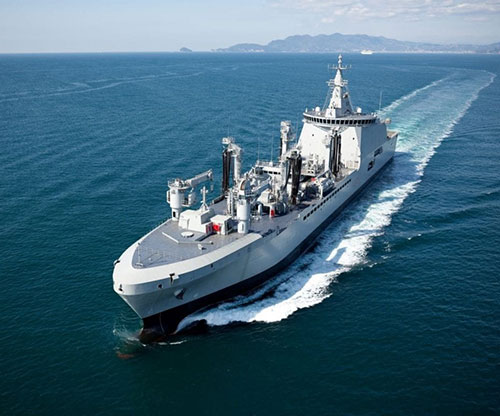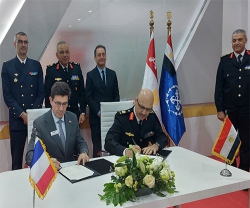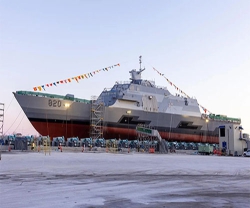The consortium - Raggruppamento Temporaneo di Impresa (RTI) - led by Fincantieri has signed with OCCAR (Organisation Conjointe de Cooperation sur l’Armement, the international organization for joint armament cooperation) a contract for the construction of a second Logistic Support Ship (LSS) for the Italian Navy, which also includes the option for a third ship.
The LSS will be entirely built at the Castellammare di Stabia shipyard, with delivery scheduled for 2025. The value of the contract is approx. 410 million euros including the combat system.
The order also includes the provision of support over the lifecycle of the vessel in the first ten years, divided into logistics and in-service support (maintenance), as well as the supply of naval components and machinery produced by Fincantieri Mechanical Systems and Components Unit, including shaft lines, steering system, maneuvering thrusters, fin stabilizers and other handling systems.
As part of the multi-year program aimed at safeguarding Italy’s Defense at-sea capacity (known as the “Naval Act”), Fincantieri is currently building seven multi-purpose offshore patrol vessels (PPA) and the “Trieste” Landing Helicopter Dock (LHD). Last March, it delivered the “Vulcano” LSS, a project that was also acquired by the French Navy for the definition of the Flotlog program, a series of units built in partnership with the Castellammare di Stabia shipyard.
The basic characteristic common to all three classes of ships is their very high level of innovation, which makes them extremely flexible in their various profiles of use with a high degree of efficiency. Most importantly, it will be possible to use these units in a complementary way even for non-military-related activities, such as, for example, supporting civil protection in humanitarian assistance and disaster relief. Moreover, their environmental impact is low, thanks to advanced low pollution emission generators and electric-drive propulsion motors and biological waste control systems.
The LSS is a vessel that provides logistics support to the fleet, endowed with hospital and healthcare capabilities thanks to the presence of a fully equipped hospital of approximately 800 square meters, which includes: 2 operating rooms with pre-anaesthesia, a radiology room, a dentist’s office, a gynecological office, 2 emergency rooms, a clinical diagnosis lab and blood bank, an intensive care room, a CT scan room, and a burns room. The ship combines the ability to transport and transfer to other transport vessels liquid cargo (diesel fuel, jet fuel, fresh water) and solid cargo (spare parts, food and ammunitions) and to perform at sea repairs and maintenance work for other vessels.
The defense systems are limited to the capacity of command and control in tactical scenarios, communications, and non-lethal dissuasive defense systems. The LSS is also capable of embarking more complex defense systems and becoming a platform for intelligence and electronic warfare systems.
- 193 meters long
- Top speed approx. 20 knots
- 235 persons including crew and specialists
- Capacity to supply drinking water to land for approx. 6,000 people
- Capacity to provide electricity to land with 2,500 kW of power
- Possibility of embarking up to 28 ISO 20 modules, including residential and healthcare modules
- Capacity to perform rescues at sea, through recovery and seabed operations (the ship is equipped with two 30-tonne offshore cranes)
- Base for rescue operations via 2 helicopters and special vessels (2 RHIBs and 2 tenders)
Fincantieri is one of the world’s largest shipbuilding groups, the only one active in all high-tech marine industry sectors. It is leader in the construction and transformation of cruise, naval and oil & gas and wind offshore vessels, as well as in the production of systems and component equipment, after-sales services and marine interiors solutions. The Group boasts first-class references in infrastructures, and is a reference player in digital technologies and cybersecurity, electronics and advanced systems.
With over 230 years of history and more than 7,000 ships built, Fincantieri maintains its know-how, expertise and management centers in Italy, here employing 10,000 workers and creating around 90,000 jobs, which double worldwide thanks to a production network of 18 shipyards operating in four continents and with over 20,000 employees.






















